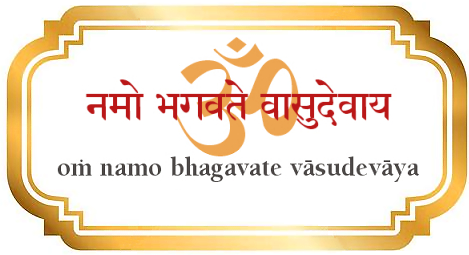

Chanting the twelve-syllable dvādaśākṣara-mantra
ॐ नमो भगवते वासुदेवाय
oṁ namo bhagavate vāsudevāya
oṁ—O my Lord; namaḥ—offering my obeisances; bhagavate—unto the Personality of Godhead; vāsudevāya—unto Vāsudeva (the son of Vasudeva), or Lord Śrī Kṛṣṇa, the primeval Lord;
O my Lord, Śrī Kṛṣṇa, son of Vasudeva, O all-pervading Personality of Godhead, I offer my respectful obeisances unto You.
PURPORT
Vāsudevāya means "to Kṛṣṇa, the son of Vasudeva." Since by chanting the name of Kṛṣṇa, Vāsudeva, one can achieve all the good results of charity, austerity and penances, it is to be understood that by the chanting of this mantra, oṁ namo bhagavate vāsudevāya, the author or the speaker or any one of the readers of Śrīmad-Bhāgavatam is offering respectful obeisances unto the Supreme Lord, Kṛṣṇa, the reservoir of all pleasure. This mantra is a viṣṇu-mantra, for by practicing the chanting of this mantra one is elevated to the Viṣṇuloka.
TEXT 54
oṁ namo bhagavate vāsudevāya
mantreṇānena devasya
kuryād dravyamayīṁ budhaḥ
saparyāṁ vividhair dravyair
deśa-kāla-vibhāgavit
oṁ—O my Lord; namaḥ—I offer my respectful obeisances; bhagavate—unto the Supreme Personality of Godhead; vāsudevāya—unto the Supreme Lord, Vāsudeva; mantreṇa—by this hymn, or mantra; anena—this; devasya—of the Lord; kuryāt—one should do; dravyamayīm—physical; budhaḥ—one who is learned; saparyām—worship by the prescribed method; vividhaiḥ—with varieties; dravyaiḥ—paraphernalia; deśa—according to country; kāla—time; vibhāga-vit—one who knows the divisions.
Oṁ namo bhagavate vāsudevāya. This is the twelve-syllable mantra for worshiping Lord Kṛṣṇa. One should install the physical forms of the Lord, and with the chanting of the mantra one should offer flowers and fruits and other varieties of foodstuffs exactly according to the rules and regulations prescribed by authorities. But this should be done in consideration of place, time, and attendant conveniences and inconveniences.
PURPORT
Oṁ namo bhagavate vāsudevāya is known as the dvādaśākṣara-mantra. This mantra is chanted by Vaiṣṇava devotees, and it begins with praṇava, or oṁkāra. The prescribed rules, as stated here by Nārada Muni, are that one should accept the mantra through a bona fide spiritual master and hear the mantra in the right ear. Not only should one chant or murmur the mantra, but in front of him he must have the Deity, or physical form of the Lord.
Not only must one receive the mantra from the bona fide spiritual master like Nārada Muni or his representative in the disciplic succession, but one must chant the mantra. And not only must one chant, but he should also offer whatever foodstuff is available in his part of the world, according to time and convenience.
The method of worship—chanting the mantra and preparing the forms of the Lord—is not stereotyped, nor is it exactly the same everywhere. lt is specifically mentioned in this verse that one should take consideration of the time, place and available conveniences. (sb/4/8/54)
TEXT 58
paricaryā bhagavato
yāvatyaḥ pūrva-sevitāḥ
tā mantra-hṛdayenaiva
prayuñjyān mantra-mūrtaye
paricaryāḥ—service; bhagavataḥ—of the Personality of Godhead; yāvatyaḥ—as they are prescribed (as above mentioned); pūrva-sevitāḥ—recommended or done by previous ācāryas; tāḥ—that; mantra—hymns; hṛdayena—within the heart; eva—certainly; prayuñjyāt—one should worship; mantra-mūrtaye—who is nondifferent from the mantra.
One should follow in the footsteps of previous devotees regarding how to worship the Supreme Lord with the prescribed paraphernalia, or one should offer worship within the heart by reciting the mantra to the Personality of Godhead, who is nondifferent from the mantra.
PURPORT
It is recommended here that even if one cannot arrange to worship the forms of the Lord with all recommended paraphernalia, one can simply think about the form of the Lord and mentally offer everything recommended in the śāstras, including flowers, candana pulp, conchshell, umbrella, fan and cāmara. One can meditate upon offering and chant the twelve-syllable-mantra, oṁ namo bhagavate vāsudevāya. Since the mantra and the Supreme Personality of Godhead are nondifferent, one can worship the form of the Lord with the mantra in the absence of physical paraphernalia. The story of the brāhmaṇa who worshiped the Lord within his mind, as related in Bhakti-rasāmṛta-sindhu, or The Nectar of Devotion, should be consulted in this connection. If paraphernalia is not present physically, one can think of the items and offer them to the Deity by chanting the mantra. Such are the liberal and potent facilities in the process of devotional service. (sb/4/8/58)